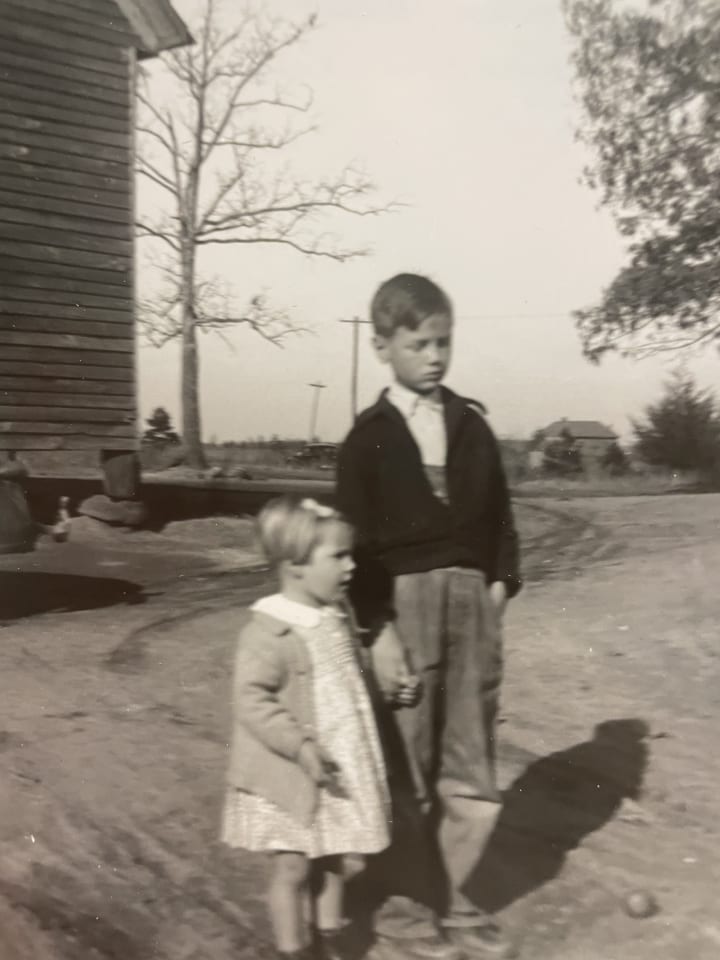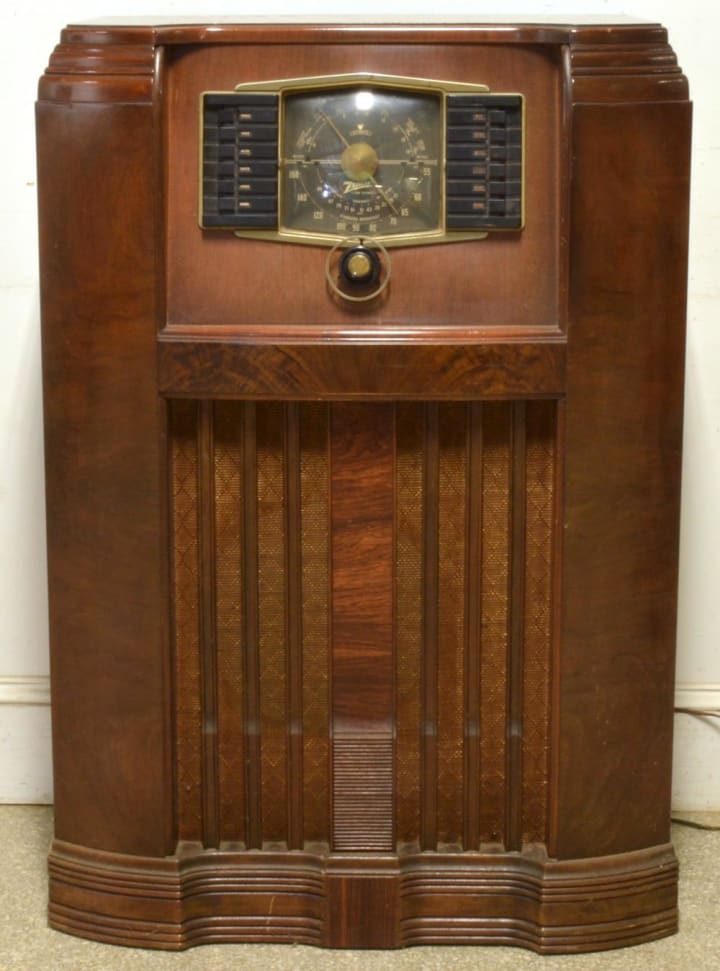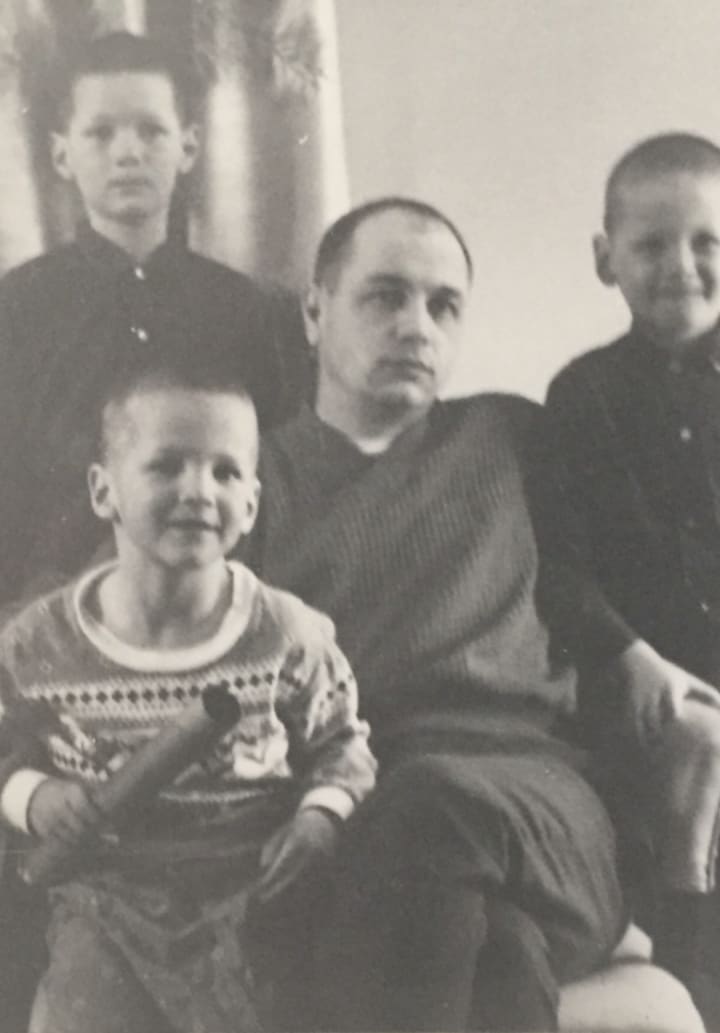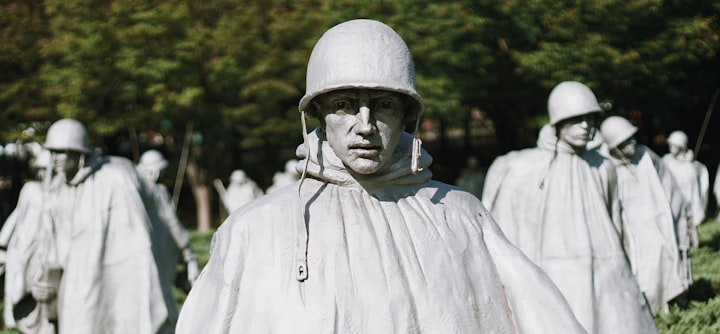From Red Dirt to Topgun
A reluctant hero illuminated

Barefoot
The sun rose over the farm field and promised another day of scorched earth as little Harold slipped out of bed to not wake his younger sister across the compact farmhouse loft. He pulled on his worn denim overalls and slid down the ladder into the semi-dark kitchen, and viewed the silhouette of his mom's back as she rolled out the biscuits for breakfast. The patched wood framed screened door squealed like a wild bird as he pushed it open, and his mom glanced over her shoulder to him.
"Harold, don't you slam the door, it angers your Pa, and watch out for snakes. The Jones boy got bit yesterday coming out of their outhouse," she said and turned back to her work.
He sat on the back step after he fed the chickens, collected eggs, and milked the cow. An hour later he ate his biscuit filled with butter and molasses and fought off a yellow jacket wanting a share.
The three-mile barefoot walk to the schoolhouse brought him past the library in Danielsville, Ga. He hoped the book Mrs. Dewey had ordered from the Athens library's loan program had arrived. The Basics of Radio. By the fall of 1940, he had built his first functional radio from scrap parts he gathered at ten years old.

Dueling Radios
The family moved to Commerce, Ga, in 1941 where his parents worked at the Harmony Grove Mill and procured better living quarters but it also brought extreme noise through the thin-walled mill house.
Their neighbor next door, a single man, worked the second shift and fired up his Zenith radio after midnight every night. He owned the only radio on the street. The distorted squeaks and squawks transitioned into the latest boogie-woogie tune broadcast from Athens radio station WRFC 960. Every night the noise woke Harold, his sister Faye, and most all the neighbors until the man went to bed at two a.m. Harold, through his self-study, learned his homemade radio receiver could be converted into a low-powered transmitter.
The neighbor's radio blared through walls the following night; Harold powered up his converted radio and turned the tuner until he found the right frequency. He negated his neighbor's music to static. The neighbor tuned to a blues station, and Harold found the frequency to cancel. After several attempts at different stations, the man gave up, and all went quiet. Seven nights and seven duels ended when the noisy neighbor transferred to another mill. The following Saturday morning, Harold sat on the front steps as the man next door loaded his car. The Zenith radio, the nemesis of sufficient sleep, sat on the neighbor's front porch.
"Harold, you are always searching for parts for your projects. The Zenith radio on the porch is a piece of junk. If you can fix the radio or use the parts they're yours," he said and drove off.

Thirty Thousand Feet
Harold graduated from Commerce High School in 1947 with a class of forty-one students after eleven grades, the final grade level in Georgia. His Pa had lined up employment for him as a bookkeeper apprentice at the mill, a real honor. This would become a life-long conflict with his Pa, who thought his son didn't accept his place. Instead, Harold entered the U.S. Air Force, only fourteen days old as a new military branch, and became a Radioman.
During the Korean War, as a Tech Sergeant stationed in the Alaska territory, Harold drew the ragging of his superiors when he applied to sit for the military's College Equivalency Exam. The Air Force had created a Flight Cadet program to fill a staff shortage with pilots. To gain entry, the candidate had to be a college graduate and compete via a Cadet Entrance exam for the one hundred Cadet slots.
Passing the College Equivalency would allow him to compete against college graduates to enter the Flight Cadet program. His superiors laughed at the idea a Georgia farm boy, who wouldn’t accept his lower place in the world, wanted to become a pilot and an officer in the military. Harold passed the exam anyway.
The senior officers scorned and harassed Harold because he didn't stand a chance in hell of besting twenty-one hundred college graduates for the one hundred cadet slots. He did and placed fifty-third upon entry. He graduated second in his flight class.

On the morning of November 15, 1954, silver wings were pinned to his chest and a single bar to his shoulder for the rank of 2nd Lieutenant and single-seat combat fighter pilot slot in the U.S. Air Force. He went from a dirt farm to forty thousand feet in twenty-four years. He didn't only break through the sound barrier but dozens of social, economic, systemic educational barriers. In the early afternoon, his wings were clipped when he married Mary Katherine, his fiancée of two years.
Topgun
Harold, sat with his flight suit on, in the Alert shack at the end of the runway at Goose Bay, Labrador. The hotcocked (preflighted) All-Weather Interceptors sat outside the modular building with the generators attached. The ground crew waited in the next shack. The temperature was 0 degrees F and visibility was one-quarter of a mile. The flashing yellow lights of snowplows could be seen working their way down the runway to keep it clear.
The clock on the wall read 400 hours when the alert claxons went off with their loud blare. He jumped up, grabbed his helmet and ran for the door and ramp. The ground crew had already fired the generators that cleared the jet turbines as he climbed the ladder into the cockpit and pulled his helmet on. The crew chief had followed him up the ladder did a visual check, gave a thumbs-up, and jumped to the ground.
The crew disconnected the ground generators. Harold flipped on the onboard generators and went through the start-up checklist. He looked to his wingman a few minutes later and received a thumbs up. They were ready.
He pushed the throttle and angled the screaming jet to the runway as the canopy closed, received tower clearance, gave full power, stood on the brakes, released them, and shot forward. At full rotation, he lifted off, retracted the gears, gathered speed and pulled into a climb, into zero visibility and leveled off at 30,000 feet. His flight clock read 415 hours.
The tactical control tower gave him intercept coordinates for a pair of Russian Bear Bombers that radar had tracked over the artic as a threat to the United States. The entire flight to the intercept, where the Bears turned away, was zero visibility and one hundred percent flown by instruments.
Visibility returned on final approach as they broke through the cloud ceiling at twelve hundred feet. Just another day in the life of an intercept pilot and a million miles from walking the red dirt road to school barefooted.

Air Force Retirement
Harold retired from the military in 1967 after twenty years of faithful service and moved his family to Summerville, SC. He wrote the book" Cold War Fighter Pilot," which is still in print, to tell his story to his boys and document the Cold War struggles. From intercept missions over the artic to being a temporary co-pilot on a B-52 bomber during the Cuban missile crisis. He lost many squadrons members and friends in Korea, Vietnam, and in training accidents. There are some things he never spoke about.
Civilian Service
The centralized Air Conditioning kicked on to offset the heat the cooler night failed to defeat, and Harold rose from the bed, dressed, and slipped into the hallway. He eased open the other two bedroom doors and checked in on his four sons, who were still asleep before he left the house.
First light broke over the horizon as he pre-flighted the Civil Air Patrols Cessna, a far cry from the combat aircraft he had over five thousand hours logged. The Cessna provided the dangerous, slow and low-level flight required to fly search and rescue along the wild winding Edisto river where a fisherman had been declared missing near Charleston, S.C. Late in the flight, he spotted the missing man and called in the rescuers.

The following day, with only a high school diploma, he arrived at Avco-Lycoming, where he worked as an electronic engineer after he passed their engineering exam. Years later, he started his own business in electronics which he operated the remainder of his work years.
In the community, he was considered hard-working, honest, and a good father. Little did anyone know the secrets he held close to his chest.
The Hero Illuminated
Harold brought his family from poverty to a sustained life by his intellect, discipline, pragmatic philanthropy, and hard work from a dusty red dirt farm. The family learned his and Mary Katherine’s secrets when he died in 2019 at eighty-nine. He was a prolific but silent philanthropist with his time and money.
Randy, a young man, came to the house for his wake. No one knew him. Harold had been coaching him and supported him away from a life of alcohol, drugs, and illiteracy into a stable life for the past ten years.
After a nasty divorce and near bankruptcy, Beth, a neighbor across the street, had been financially assisted, guided, and coached into financial and emotional stability by Harold.
Paul, a stranger to most, told us how he stood at the busy meat counter with two packs of meat, one in each hand. He stopped Harold and asked him which one was the best price because he couldn't read. The following week the man joined the class Harold taught at the Literacy Council.
Young Air Force pilots from Charleston Air Force, at the memorial service, told us how he had impacted their lives with his wise counsel in the challenges of their careers.
The SC Ham Radio Net president came and bragged about Harold being named the S.C. Ham Radio operator of the year four times for his work on the active net during national emergencies with FEMA, including Hurricane Katrina. We found the awards hidden in a cabinet in his radio room.

No one told of his help because he demanded, from all, their discretion. The list is long.
He believed education was free for learning and a piece of paper never replaced the actual knowledge anyone attained.
Harold retired from his business but never stopped helping anyone with the desire to learn and improve themselves. He taught Literacy, coached hundreds through financial hardship programs, ran the SC Ham Radio Net, flew Civil Air Patrol missions as long as his eyesight lasted, volunteered to the community, and raised four boys with the help of his partner of sixty-three years, Mary Katherine.

Harold was my Dad
If Harold Wade is not a hero then there are no heroes. He’s my Dad and I could not be prouder.
We sat and talked at the kitchen table the year after my mom, his wife and awesome sidekick, Mary Katherine, died.
"I don't know if I did a credible job of being a father with you and your brothers," he said with tears in his eyes.
"Dad, you have led this family by strict discipline yes, but you also taught us by example of how we should live, to help others with humility, and can achieve anything through education, formal or not, if we apply ourselves. You taught us there is no higher call than one of duty and honor to family and your country. You have been a great father," I said, astounded.
Harold, my dad, never forgot where he started, on a tenant farm. He took his life approach and gave it to others without expecting a return or reward, including to my brothers and me. In his eighty-nine years, he quietly made the world a safer place, raised a family, made his community more vital, and expected no credit. Harold left this world as he was born but left behind a massive residual of goodwill to go on through perpetuity for the hundreds, if not thousands of lives, he helped and influenced, including mine.
His last act and example on this earth was to donate his body to science through the Medical University of S.C. research program to help others in the future.
Years prior, when I questioned his decision he said, "I will be gone into the heavens. The last thing I can give is this old worn body that might help others."
I know his spirit soars through the heavens on wings of flight with my mom to his well-earned reward. He is my hero and the hero of countless others. I can only strive to be like him.
Thank you, Dad. You will always be Topgun.


About the Creator
J. S. Wade
Since reading Tolkien in Middle school, I have been fascinated with creating, reading, and hearing art through story’s and music. I am a perpetual student of writing and life.
J. S. Wade owns all work contained here.
Enjoyed the story? Support the Creator.
Subscribe for free to receive all their stories in your feed. You could also pledge your support or give them a one-off tip, letting them know you appreciate their work.
Reader insights
Outstanding
Excellent work. Looking forward to reading more!
Top insights
Easy to read and follow
Well-structured & engaging content
Excellent storytelling
Original narrative & well developed characters
Heartfelt and relatable
The story invoked strong personal emotions






Comments (2)
Now that's a life well lived! And he made it to 89- fantastic! My dad was a vet too, chock full of wild stories, many of which he wouldn't tell us. I have memories of hiking the bush around Goose Bay when the Germans were using the base for training- NATO still uses it I believe. Weird juxtaposition between wilderness and roaring jets lobbing bombs in the distance. Your dad sounds pretty wonderful Scott.
Beautiful and heartwarming tribute to your awesome and amazing dad!👏💖😊💕